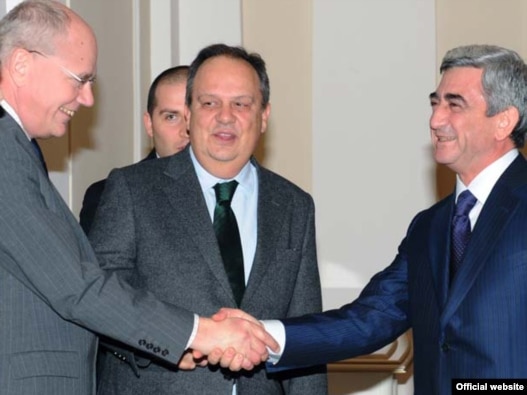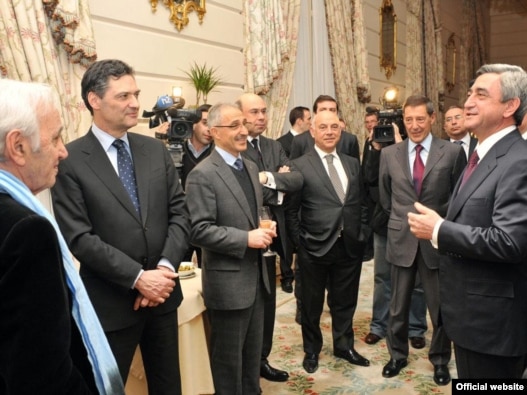[ 10 Mar 2010 14:44 ]
By Alexander Jackson, Caucasian Review of International Affairs exclusively for APA
The tangled relationship between history and politics was underlined last week when the US House Foreign Affairs Committee narrowly voted to label the 1915 massacre of Armenians in the Ottoman Empire as ‘genocide’ (BBC, March 5). In principle the resolution now moves to the floor of the House for a full vote.
In practice, this is unlikely to happen. The Obama Administration stayed oddly quiet in the run-up to the committee vote, until, at the last minute, Secretary of State Hillary Clinton acted. She called on committee chairman Howard Berman to acknowledge that a vote would damage US-Turkish ties and undermine efforts at reconciliation between Turkey and Armenia. The US government is now moving to block the resolution coming before the full House (RFE/RL, March 5).
However, its opposition has been weak, and certainly less vociferous than that of George Bush in 2007, when a similar resolution was passed. The current Administration’s last-minute scramble looks like a foreign-policy miscalculation rather than a deliberate omission, although the reaction in Turkey is nonetheless furious.
If the resolution stays out of the House, then Turkey is likely to limit its immediate response to angry protests and denunciations. However, the longer term implications are harder to gauge, and potentially serious. Suat Kiniklioglu, a representative of Turkey’s ruling AKP, made it clear that the implications of a full vote would be serious: “Everything from Afghanistan to Pakistan to Iraq to the Middle East process would be affected. There would be major disruption to the relationship between Turkey and the US” (Guardian, March 5).
The most commonly voiced danger is that Ankara would deny the US access to the Incirlik air base, a vital logistical hub for supplying Afghanistan and an essential part of any plan to withdraw from Iraq. Turkey might also withdraw its forces from Afghanistan. Either of these may be too harsh and too obvious a measure, but both will become more viable options if the relationship deteriorates further. The main danger is more subtle. Turkish cooperation on vital issues would be much harder to come by. In particular, securing Ankara’s assistance to pressure Iran over its nuclear programme would be extremely difficult.
The damage may already have been done. The perception that Washington does not value Turkey’s strategic leverage has been underlined by the vote, even if the White House now fights to stop it going to the House. In a politically charged atmosphere such as Turkey, the actions of the US legislature are likely to be conflated with the opinions of the executive.
In this respect the remarks of committee chairman Berman come across as flippant and dismissive. He stated that Turkey is “a vital and, in most respects, a loyal ally of the United States”, which could easily be construed as a patronising chastisement (House Foreign Affairs Committee, March 4). More significantly, he brushed aside Turkish criticism by arguing that “Turkey values its relations with the United States at least as much as we value our relations with Turkey.” In other words, you need us too much to respond to this.
Such attitudes will hardly reduce the existing strains on the Turkish-American alliance. Recent events will intensify Ankara’s strategic shift towards Russia (notwithstanding the fact that Russia’s State Duma too has officially recognised 1915 events as genocide). Any policies or geopolitical shifts which seem to oppose ‘American imperialism’ will be loudly welcomed on the Turkish streets, a fact which will not be lost on the populist AKP.
In fact, although the Turkish government asserts otherwise, this growing tide of nationalist anger could do serious damage to the protocols which would formalise the rapprochement with Armenia. The AKP holds the parliamentary majority necessary to ratify the protocols, but was unwilling to push the matter too hard even before the US committee vote. In the aftermath of the resolution, nationalist anger will only intensify, forcing the AKP to expend even more political capital on ratification.
It may be unwilling to do so, and prefer to view the current clamour as a justification to block ratification, blaming the issue on Armenia and its powerful diaspora in the US. Reassuringly, it seems the AKP, hoping that a full House vote on the resolution will be blocked, is unlikely to resort to such measures at the moment, although the rapprochement has certainly been damaged by the vote – as Turkish Foreign Minister Ahmet Davutoğlu observed bluntly, “Further intervention by third parties will render this normalization impossible” (Sundays Zaman, March 7). Turkey undertook the rapprochement out of its own national interest, not to please Washington, but the vote looks like a clumsy attempt to lean on Ankara.
That is the crux of the matter. Mr Berman insists that the resolution is simply historical. But Washington must understand that this vote is construed – in Ankara and across Turkey – as undue, poorly-timed pressure on the normalisation process between Turkey and Armenia. After all, Turks may reasonably ask, why now?
The Obama Administration is likely to salvage the matter for now by keeping the vote out of the House. But its lacklustre response to the issue will not win America many friends in Turkey, which has been decidedly underwhelmed by the US in recent years. Simply assuming that Turkey needs America, or taking it for granted, is short-sighted. The consequences of the current crisis may not be visible for some time, but they could be serious.
 Armenia — President Serzh Sarkisian greets Goran Lennmarker (L), chairman of the Swedish parliament committee on foreign affairs, in Yerevan, 12 March 2010.
Armenia — President Serzh Sarkisian greets Goran Lennmarker (L), chairman of the Swedish parliament committee on foreign affairs, in Yerevan, 12 March 2010.



 Armenia — President Serzh Sarkisian (R) meets with prominent members of France’s Armenian community in Paris, 10 March 2010.
Armenia — President Serzh Sarkisian (R) meets with prominent members of France’s Armenian community in Paris, 10 March 2010.



